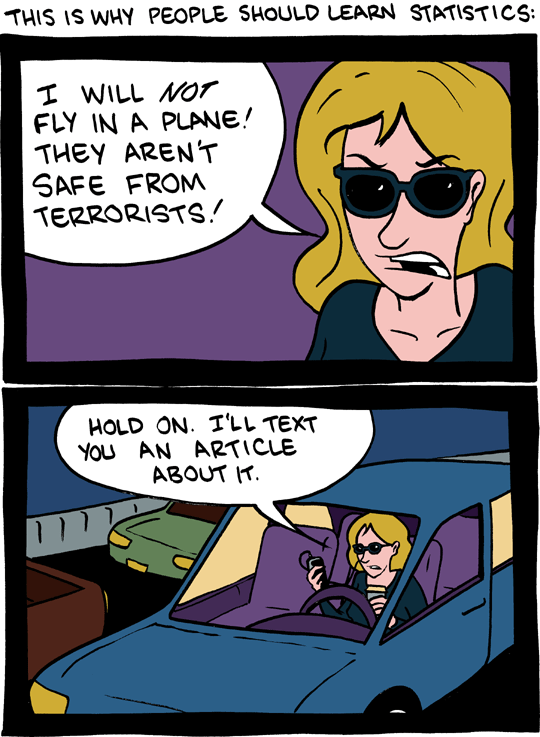I am constantly amazed that people will be so afraid of things that are highly unlikely, while ignoring far greater risks. Why are we so afraid of terrorists? And yet every day we do things that are thousands of times riskier?
-
‹ Home
Info
-
Subscribe
-
Users
Links
- All Hat No Cattle
- Andy Borowitz
- Axios
- Barry Deutsch
- Bearman Cartoons
- Beau of the Fifth Column
- Capitol Steps
- Cook Political Report
- Crooks and Liars
- Daily Kos Comics
- Daily Show
- David Horsey
- Derf City
- Digby
- Eclectablog
- Electoral Vote
- Fair and Unbalanced
- Fark Politics
- Five Thirty Eight Politics
- Funny or Die
- Funny Times
- Go Comics
- Hackwhackers
- Heather Cox Richardson
- HuffPost Comedy
- John Fugelsang
- Kung Foo Monkey
- Last Week Tonight
- Margaret and Helen
- Mark Fiore
- Matt Davies
- Matt Wuerker
- McClatchy Cartoons
- News of the Weird
- O'Carl's Law
- Politicususa
- PolitiFact
- Propaganda Professor
- Raging Pencils
- Randy Rainbow
- RCP Cartoons
- Saturday Night Live
- Slowpoke
- Stonekettle Station
- Ted Rall
- The Nib
- The Onion
- Tom the Dancing Bug
- Tom Toles
- USN Political Cartoons
- What Now Toons
-
Tags
Abortion Bush Campaign Finance Cheney Climate Clinton Congress Conservatives Corporations Corruption Deficits Democrats Drugs Economy Education Election Elections Energy Environment Fox News Gays Guns Health Immigration Lies McCain Media Middle East Obama Palin Protests Racism Religion Republicans Romney Spying Supreme Court Taxes Tea Party Terrorism Terrorists Torture Trump Unemployment War
-
Archives

You are Visitor #


10 Comments
Perhaps it’s the idea of being more afraid of things that are outside your control? I suppose we like to pretend that things that are within our control aren’t as dangerous because we won’t let them be.
You’re absolutely correct IK. There is a far greater chance of death in an automobile then by terrorist attack. Heck, there is a greater chance of being killed in my city then serving a combat tour in Iraq.
I heard an interesting conspiracy theory on the plane/security/terror issue. It went that the green energy and cut carbon emissions advocates were stirring the controversy to help further their goal of reducing airline traffic to reduce carbon emissions. With those percentage of Americans who believe whatever the news tells them they could easily persuade 10-20% of potential flyers to not go, or seek alternate travel using either the increased security or threat of terror to reach their goal.
Wow, that’s a bizarre conspiracy theory. Reduce carbon emissions by convincing people to drive long distances rather than fly? LOL.
Freddie, I think you may be on to something. People think “I can drink 5 beers and drive home, no problem!” because they are (theoretically at least) in control. Or people keep a loaded gun in their house, even though statistically that makes them less safe. People are more afraid of not being in control than they are from dying I suppose. Almost like they are saying “if I am going to die, I want it to be from some stupid thing I do, like texting while driving.”
I think the flying fear, beyond terrorism, is that most automobile accidents do not result in death, but when a plane goes down, everyone dies. Even though the chance of that happening is slim, I think the fear still stymies some folks.
You are still way more likely to die in an automobile accident than in an airplane (from any cause, not just terrorism).
In “Collapse” Jared Diamond talks about the differences in anxiety level of people living below a dam wall. It increases in proportion to the proximity to the wall, until you start getting within viewing distance at which point it drops off to nothing.
We don’t fear automobiles because we are so close to them, and because it would make life unlivible to have that fear present everytime we get behind the wheel.
The risk management literature talks a lot about this issue. There are a number of factors. One is the issue of control. That is related to what many in the social psych feel is the key issue: imposed risks versus assumed risks. Getting behind the wheel of the car is an assumed risk. Even if we know what the risks are, we still do it because we feel like we have more control over our fate (“I’m a good driver”) and because we believe we have little choice (“I need to get to work”). Terrorism may be viewed as an imposed risk that is both unknown and out of our control. Someone else decides whether to make your flight unsafe (or safe) and the lack of control is viewed as less acceptable than known threats of higher risk.
Glenn Toden: that is a fascinating finding.
IK: I know the stats, and I’m not a fearful flyer. I was just trying to explain the mentality of those I know who are afraid to fly.
Sammy – I’ve heard the same thing from some people. My husband hates to fly. His main reason is the lack of control and the tight space. On the train, he can get up and walk around. If he really needs to get out, he can get out at a platform and wait for the next train. When we have to fly cross country, we always try to have one stop in the middle just to get out of the plane. It makes for a longer journey, but it also helps with the anxiety.